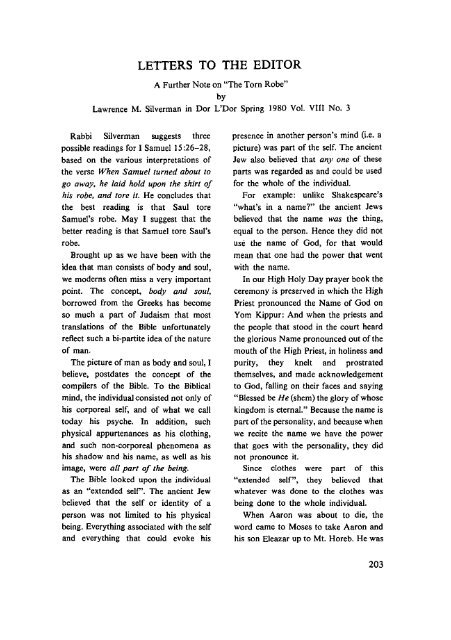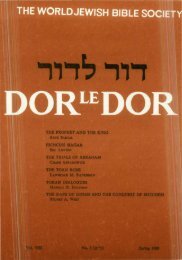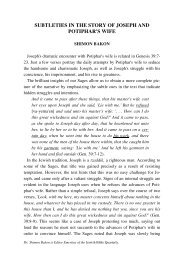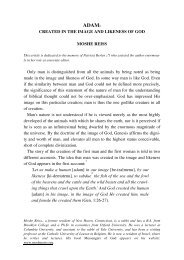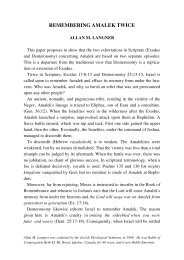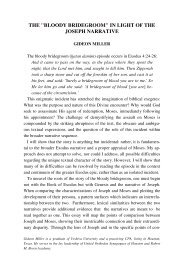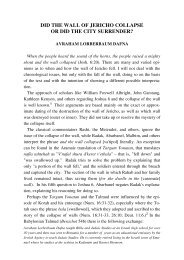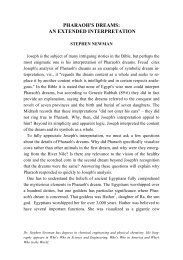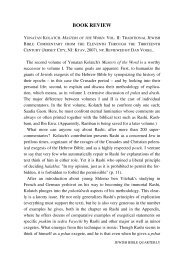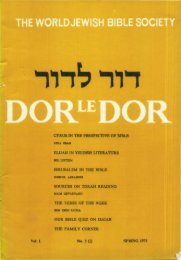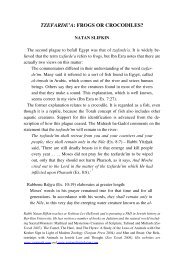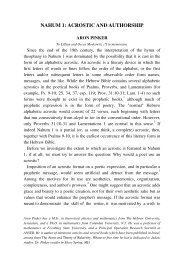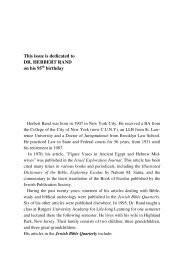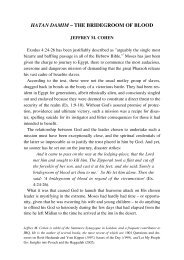The Development of Biblical Prayer - Jewish Bible Quarterly
The Development of Biblical Prayer - Jewish Bible Quarterly
The Development of Biblical Prayer - Jewish Bible Quarterly
You also want an ePaper? Increase the reach of your titles
YUMPU automatically turns print PDFs into web optimized ePapers that Google loves.
LETTERS TO THE EDITOR<br />
A Further Note on "<strong>The</strong> Torn Robe"<br />
by<br />
Lawrence M. Silverman in Dor L'Dor Spring 1980 Vol. Vlll No. 3<br />
Rabbi Silverman suggests three<br />
possible readings for I Samuel15:26-28,<br />
based on the various interpretations <strong>of</strong><br />
the verse When Samuel turned about to<br />
go owoy, he laid hold upon the shirt <strong>of</strong><br />
his robe, and tore it. He concludes that<br />
the best reading is that Saul tore<br />
Samuel's robe. May I suggest that the<br />
better reading is that Samuel tore Saul's<br />
robe.<br />
Brought up as we have been with the<br />
idea that man consists <strong>of</strong> body and soul,<br />
we moderns <strong>of</strong>ten miss a very important<br />
point. <strong>The</strong> concept, body and soul,<br />
borrowed from the Greeks has become<br />
so much a part <strong>of</strong> Judaism that most<br />
translations <strong>of</strong> the <strong>Bible</strong> unfortunately<br />
reflect such a bi-partite idea <strong>of</strong> the nature<br />
<strong>of</strong> man.<br />
<strong>The</strong> picture <strong>of</strong> man as body and soul, I<br />
believe, postdates the concept <strong>of</strong> the<br />
compilers <strong>of</strong> the <strong>Bible</strong>. To the <strong>Biblical</strong><br />
mind, the individual consisted not only <strong>of</strong><br />
his corporeal self, and <strong>of</strong> what we call<br />
today his psyche. In addition, such<br />
physical appurtenances as his clothing,<br />
and such non·corporeal phenomena as<br />
his shadow and his name, as well as his<br />
image, were all part <strong>of</strong> the being.<br />
<strong>The</strong> <strong>Bible</strong> looked upon the individual<br />
as an "extended self'. <strong>The</strong> ancient Jew<br />
believed that the self or identity <strong>of</strong> a<br />
person was not limited to his physical<br />
being. Everything associated with the self<br />
and everything that could evoke his<br />
presence in another person's mind (i.e. a<br />
picture) was part <strong>of</strong> the self. <strong>The</strong> ancient<br />
Jew also believed that any one <strong>of</strong> these<br />
parts was regarded as and could be used<br />
for the whole <strong>of</strong> the individual.<br />
For example: unlike Shakespeare's<br />
"what's in a name?" the ancient Jews<br />
believed that the name was the thing,<br />
equal to the person. Hence they did not<br />
use the name <strong>of</strong> God, for that would<br />
mean that one had the power that went<br />
with the name.<br />
In our High Holy Day prayer book the<br />
ceremony is preserved in which the High<br />
Priest pronounced the Name <strong>of</strong> God on<br />
Yom Kippur: And when the priests and<br />
the people that stood in the court heard<br />
the glorious N arne pronounced out <strong>of</strong> the<br />
mouth <strong>of</strong> the High Priest, in holiness and<br />
purity, they knelt and prostrated<br />
themselves, and made acknowledgement<br />
to God, falling on their faces and saying<br />
"Blessed be He (shem) the glory <strong>of</strong> whose<br />
kingdom is eternal." Because the name is<br />
part <strong>of</strong> the personality, and because when<br />
we recite the name we have the power<br />
that goes with the personality, they did<br />
not pronounce it.<br />
Since clothes were part <strong>of</strong> this<br />
"extended self", they believed that<br />
whatever was done to the clothes was<br />
being done to the whole individual.<br />
When Aaron was about to die, the<br />
word came to Moses to take Aaron and<br />
his son Eleazar up to Mt. Horeb. He was<br />
203


